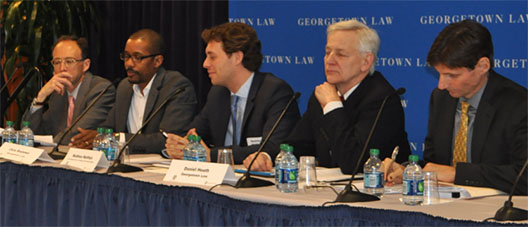 The Georgetown Journal of International Law, in collaboration with the Atlantic Council, held a high-level symposium entitled International Financial Regulation in the Post-Crisis Era on Tuesday, April 8, 2014 at Georgetown Law in Washington, DC.
The Georgetown Journal of International Law, in collaboration with the Atlantic Council, held a high-level symposium entitled International Financial Regulation in the Post-Crisis Era on Tuesday, April 8, 2014 at Georgetown Law in Washington, DC.
The event featured commentary from leading scholars and practitioners in the field of international financial regulation, as well as officials from the US Securities and Exchange Commission (SEC) and US treasury department. Throughout the symposium, the experts expressed their views on what they believed were the most pressing issues facing the international financial system, and what methods should be used to improve the system in the future.
Among the many experts was Dr. Yesha Yadav, Assistant Professor of Law at Vanderbilt University Law School, who presented on the danger of increasing divergences in financial clearing houses. “Regulation of clearing houses are diverging rapidly, particularly on capital requirements to hold against default,” Yedav stated in her presentation. Eric Pan of the SEC also voiced concerns about diverging international policies in financial regulatory bodies, and stated that more institutional robustness was necessary as global financial markets become larger and more intertwined. Among his recommendation for cooperation was the need to review the Financial Stability Board (FSB) system for effectiveness: “Implementation [within international regulatory bodies] is at the heart of regulatory policymaking, and is critically important for the functionality of the global financial system.”
One of the highlights of the conference was undoubtedly the keynote address, given by the Honorable Howard Shelanksi, Administrator for the White House Office of Information and Regulatory Affairs. Shelanksi stressed the importance of an honest and transparent dialogue among the global financial regulators. Although, he admitted, there are still significant differences in process between the two largest financial markets, the United States and the European Union. “The EU has a fundamentally different set of agencies and entities,” making cooperation cumbersome between the two systems. Shelanksi pointed to a number of possible ways to ensure the future of EU-US cooperation. One of these was the creation of a bilateral regulatory cooperation council for financial services, much like the United States has with Mexico and Canada in food, transport, e-health, and other key industries. “The regulatory cooperation with Canada is a model for future regulatory cooperation internationally,” said Shelanksi.
The question was raised, however, why Canada-US or Canada-EU cooperation has been easier to solidify than a cooperation agreement between the US and the EU. Shelanksi stated that the as of now, financial regulatory and trade cooperation between those two economies is one of the top priorities for the administration, as the high costs of systemic divergences have become more salient since the financial crisis. Although an EU-US cooperation agreement may take longer due greater institutional challenges, Shelanksi was confident that dialogues between the two economies would shore up divergences in financial markets in years to come.
The panel entitled, “Intersections of Trade and Finance,” brought together key figures from the private sector, international organizations, and academia, to discuss the future of multilateral dialogues on trade and financial services. The discussion focused around the two most prominent US trade agreements being negotiated currently, the Transpacific Partnership (TPP) and the Transatlantic Trade and Investment Partnership (TTIP). Sven Gentner, Counselor for Economic and Financial Affairs at the Delegation of the European Union to the United States, expressed that without effective regulatory dialogue, there would undoubtedly be significant risks to financial stability in the form of regulatory arbitrage and divergence. In the context of the US-EU relationship, Gentner believes that TTIP provides the necessary framework to address these divergences. “Today’s level of cooperation is insufficient. A more robust dialogue, not only at a bilateral [US-EU] level, but at a global level is crucial,” Gentner suggested. In regard to TTIP, Clay Lowery, vice president of Rock Creek Global Advisors, stated the most important part of the agreement is presidential backing. He also expressed the necessity for financial services to be included in the TTIP negotiations, stating “if we can address more life and death issues such as auto safety and food safety, why not finance?”
The final panel of the conference focused on international cooperation and economic diplomacy in the 21st century, which was in honor of Atlantic Council C. Boyden Gray Fellow Chris Brummer’s upcoming book, Minilateralism. The panel was opened withremarks by the Hon. C. Boyden Gray, former US Ambassador to the European Union in Brussels (2006-07). Brummer’s new book focuses on the changing landscape of economy diplomacy, and argues that the multilateral organizations that dominated the last half of the twentieth century no longer monopolize economic affairs. Instead, Brummer argues, countries are resorting to more modest “minilateral” strategies like trade alliances, informal “soft law” agreements, and financial engineering to manage the global economy. Like traditional modes of economic statecraft, these tools are aimed at both liberalizing and supervising international financial policy in a world of diverse national interests, but unlike before, they are specifically tailored to navigating a post-American (and post-Western) world where economic power is more diffuse than ever before. The book explains how these strategies work, and reveals how this new diplomatic toolbox will reshape how countries do business with one another for decades to come.
Minilateralism is available on Amazon.
